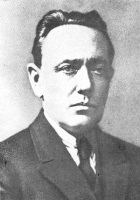Jurgis Baltrušaitis
Jurgis Baltrušaitis Poems
The day's wild ocean sings and thunders,
And beats against the fatal shore,
This breaker with dumb sorrow sunders,
...
The sun's hanging low in the sky,
All the woodland birds quieten now.
They gather in flocks and fly
From the woods, now more spacious, somehow.
...
When pain assails your heart to tear it,
Your naked heart, its helpless prey,
Receive the gift of grief and bear it,
...
Loudly and sadly, one stroke on another,
Sang the bell to the slumbering world...
Just like the tocsin when fire is approaching,
...
Greet the tender grassblades by your path, and listen
While the clay-sprung grass that's fine as hair will whisper,
...
A tumbledown old house I know –
Beside its doorstep burdocks grow;
Its narrow windows seem to wince
As if it grieves and weeps long since,
...
Camomile, you mite of whiteness,
To refresh the road I've taken,
Rising from the dust, you stand there,
...
Little daisy, white as snow,
To delight me as I tread,
From the roadside dust you grow,
Lifting up your pretty head.
...
I
The dawn has caught fire ere the coming of day!
Night calls back her shadows to the ravines,
...
Ocean and droplet, like corn – ear and flower,
Breathe in fulfillment of one same behest:
Winter and summer it spins in the world
...
I have been roaming on for days and days.
Ensnared in days, I wander on and on,
Whole days along my destined roads and ways,
...
An orphan's fate, to stray and stumble
On ways of blood and fire, is thine...
Yet in your wordless grief, my humble,
...
Let the headsman's black axe sever
The thread of life the Highest spun;
Immortal thought it will not bring to ruin,
...
Not for a flash of flame – your zither, brother!
Its charm is charged to praise the macrocosm
Where ages gather, in one enigmatic circle,
...
Jurgis Baltrušaitis Biography
a Lithuanian Symbolist poet and translator, who wrote his works in Lithuanian and Russian. In addition to his important contributions to Lithuanian literature, he was noted as a political activist and diplomat. Himself one of the foremost exponents of iconology, he was the father of art historian and critic Jurgis Baltrušaitis Jr. Writer Baltrušaitis was born to a family of farmers in Paantvardys village near Jurbarkas, which was then under Imperial Russian rule. In 1885, he entered Kaunas gymnasium, and graduated in 1893; he then entered the Faculty of Physical and Mathematical Sciences at Moscow University. At the same time, he attended lectures in the Faculty of History and Philology, and studied foreign languages; Baltrušaitis learned 15 foreign languages during his life. From 1895 onwards, Baltrušaitis began to take part in editing Moscow-based literary magazines, and he began his own his creative work in Russian. He joined the Symbolist movement, and, in association with Sergei Polyakov, set up the publishing house Scorpio, which published the chief Russian Symbolist magazines such as Vesy and Severnyie Tzvety as well as collections of the greatest Russian Symbolist poets. A member of the city's cultural elite, Baltrušaitis was a close friend and colleague of such famous Russian writers and artists as Anton Chekhov, Konstantin Bal'mont, Valery Bryusov, Vyacheslav Ivanov, Maksim Gorky, Konstantin Stanislavsky, Mikhail Vrubel, and Aleksandr Scriabin; Boris Pasternak was the private home tutor of Baltrušaitis's children. Baltrušaitis published three collections of poetry in Russian, and another three in Lithuanian. He authored many Russian translations of modern literature, including ones from Henrik Ibsen, Oscar Wilde, August Strindberg, Knut Hamsun, and Gabriele D'Annunzio. His translation of Hunger by Hamsun is considered a classical rendering of this work into Russian, and has been continuously republished right up to contemporary times. Politician Between 1900 and 1914, Baltrušaitis often visited and lived in countries of Western Europe, most of all Italy and Norway. He spent the years of World War I and the Russian Revolution in Russia, where he actively participated in the Lithuanian political struggle for independence. In 1919 he was elected President of the Russian Union of Writers, and is known for his efforts to help and rescue many writers and intellectuals during the first years of the Bolshevik regime. Baltrušaitis was appointed ambassador independent Lithuania's ambassador to Russia in 1920, and he held this position until 1939. In 1932 he was honored with the award of a doctorate honoris causa by Vytautas Magnus University in Kaunas. Baltrušaitis was appointed a counselor of the Lithuanian embassy in Paris in 1939. His son, Jurgis Baltrušaitis Jr., an art and art critic, was also a Lithuanian diplomat during the Soviet annexation of Lithuania, when the Lithuanian diplomatic service continued to represent Lithuanian interests in some Western countries. Baltrušaitis died in Paris in January 1944; he is buried at Montrouge cemetery.)
The Best Poem Of Jurgis Baltrušaitis
The Surf
The day's wild ocean sings and thunders,
And beats against the fatal shore,
This breaker with dumb sorrow sunders,
And these like laughing victors roar,
Their sheen – one joy of vernal wonders,
Their sheen – vast winter's shining hoar.
In wrath triumphant forward swinging,
The lifted billow calls and fails,
A joyous giant shouting, singing,
Its voice the voice of sounding gales,
Its glory in the sunlight flinging,
Whose noonday glow it holds and hails.
Across the sea, now lightly foaming,
Another rears, that stirs the deep,
And floods the shore with the silence gloaming;
Morose and slow it seems to creep
Like one who drops, worn out with roaming,
From his bent back a fatal heap.
Each moment new, with changing power,
The surf is thundering alone.
Now idle, now it seems to lower,
Hymning a sylence all unknown,
Like a dark heart asleep, – for hour
On hour in restless monotone.
